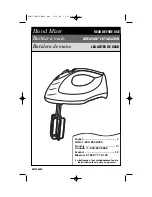
9
Owner’s Manual
Owner’
s Manual
1. Mic Ins
This is a female XLR connector that accepts a
balanced mic or line level input from almost any type
of source. These Onyx mic preamps feature higher
fidelity and headroom rivaling any standalone mic
preamp on the market today.
These circuits are
excellent at rejecting hum and noise.
The XLR inputs are wired as follows:
Pin 1 = Shield or ground
Pin 2 = Positive (+ or hot)
Pin 3 = Negative (– or cold)
Professional ribbon, dynamic, and condenser mics all
sound excellent through these inputs. The mic/line
inputs will handle any kind of level you can toss at
them, without overloading.
Not every instrument is made to connect directly to
a mixer. Guitars commonly need a Direct Injection (DI)
box to connect to the mixer's mic inputs. These boxes
convert unbalanced line-level signals from your guitar,
into balanced mic-level outputs, and provide signal and
impedance matching. They also let you send your gifted
guitar renditions over long cables or audio snakes,
with minimum interference or high-frequency signal
loss. Ask your dealer or guitar maker about their
recommendations for a good DI box.
Phantom Power
Most modern professional condenser mics are
equipped for phantom power, which lets the mixer
send low-current DC voltage to the mic’s electronics
through the same wires that carry audio. (Semi-pro
condenser mics often have batteries to accomplish the
same thing.) “Phantom” owes its name to an ability to
be “unseen” by dynamic mics (Shure SM57/SM58, for
instance), which don’t need external power and aren’t
affected by it anyway.
The 1642VLZ4’s phantom power is globally controlled
by the phantom [22] switch on the rear panel.
(This means the phantom power for all channels
is turned on and off together.)
The GAIN controls for stereo channels 9-10 and 11-12
are only used to adjust the Mic inputs. The line inputs
are set to unity gain.
The GAIN controls for channels 13-14 and 15-16 only
adjust the line-level inputs, as they have no Mic inputs.
4. Insert
Found only on channels 1–8, these unbalanced 1/4"
jacks are for connecting serial effects processors such
as compressors, equalizers,
de-essers, or filters. The insert point is after the gain
[3] control, but before the channel’s EQ [32], low cut
[34], fader [25] and mute [30] controls. Insert cables
must be wired thusly:
Tip = send (output to effects device)
Ring =
return (input from effects device)
Sleeve =
common ground
Even though channels 1–8 already have direct out [5]
jacks , insert jacks can also be used as channel direct
outputs; post-gain, pre-low cut, and pre-EQ. See the
connector section on page 27 showing three ways to use
insert cables.
tip
This plug connects to one of the
mixer’s Channel Insert jacks.
ring
tip
ring
sleeve
SEND to processor
RETURN from processor
(TRS plug)
Never plug single-ended (unbalanced)
micro phones, or ribbon mics into the mic
input jacks if the phantom power is on.
Do not plug instrument outputs into the
mic input jacks with phantom power on
unless you know for certain it is safe to do so.
2. Line Ins
These 1/4" jacks share circuitry (but not phantom
power) with the mic preamps, and can be driven by
balanced or unbalanced sources at almost any level.
You can use these inputs for virtually any signal you’ll
come across, from instrument levels as low as –50 dB to
operating levels of –10 dBV to +4 dBu, as there is 45 dB
of gain available via the gain [3] knob. Note that
channels 1-8 line inputs are intially attenuated by
15 dB. Always make sure to perform the level setting
procedure on page 5.
To learn how signals are routed from these inputs,
see the details lovingly described in the channel strip
section.
To connect balanced lines to these inputs, use
a 1⁄4" Tip-Ring-Sleeve (TRS) plug, wired as follows:
Tip = Positive (+ or hot)
Ring = Negative (– or cold)
Sleeve = Shield or ground
To connect unbalanced lines to these inputs,
use a 1⁄4" mono (TS) phone plug, wired as follows:
Tip = Positive (+ or hot)
Sleeve = Shield or ground
3. Gain
These controls are not in the patchbay, but
they are the top row of knobs in the channel strip
section. (They are so vitally linked with the inputs,
this seemed like a good place to describe them.)
If you haven’t already, please read the level-setting
procedure on page 5.
Gain adjusts the input sensitivity of
the mic and line inputs. This allows
signals from the outside world to be
adjusted to optimal internal operating
levels.
If the signal originates through the XLR jack, there
will be 0 dB of gain with the knob fully down, ramping
to 60 dB of gain fully up.
Through the 1⁄4" input, there is 20 dB of attenuation
fully down and 40 dB of gain fully up, with a “U” (unity
gain) mark at 10:00. This 20 dB of attenuation can be
very handy when you are inserting a very hot signal, or
when you want to add a lot of EQ gain, or both. Without
this “virtual pad,” this scenario might lead to channel
clipping.
3










































